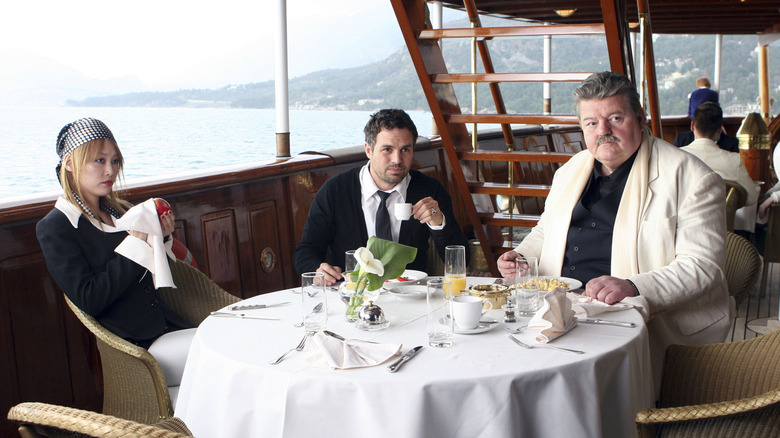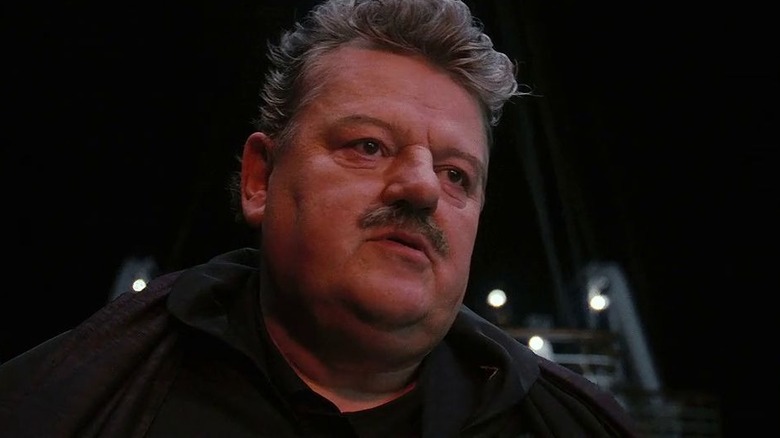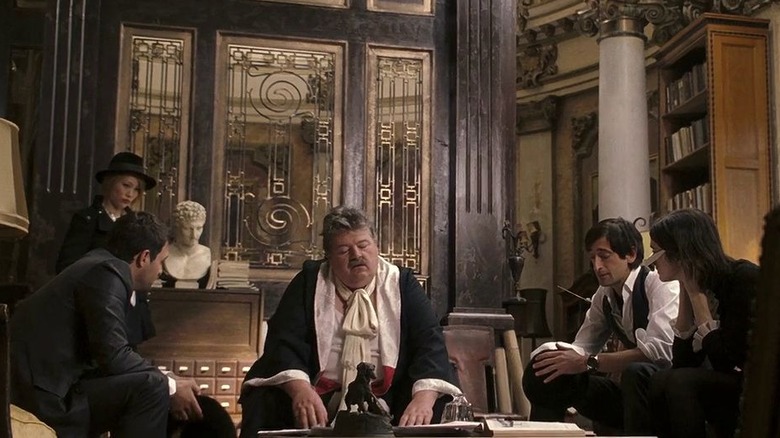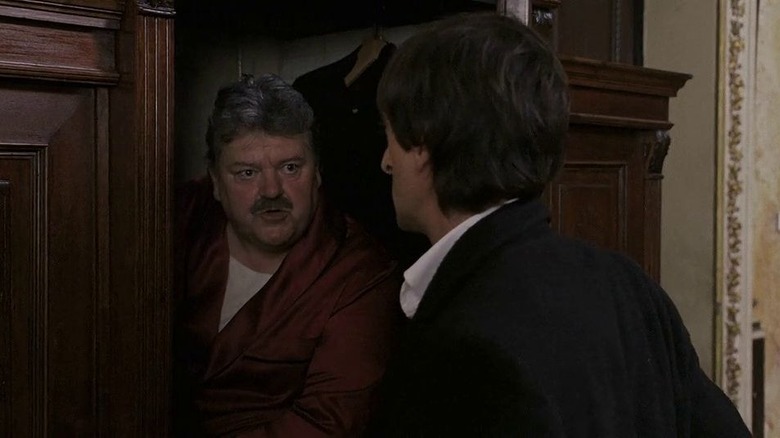Robbie Coltrane's Most Underrated Performance Came In Rian Johnson's Most Underrated Movie
When most people think of Scottish actor Robbie Coltrane, they probably think of Hagrid from the "Harry Potter" film series, or as the semi-villainous Valentin Zukovsky facing off against James Bond in "GoldenEye," but I immediately think of the Curator from Rian Johnson's 2008 film "The Brothers Bloom." Johnson has a pretty incredible filmography that includes the controversial "Star Wars: The Last Jedi" and the universally beloved "Knives Out," but "The Brothers Bloom" has always been my favorite of his movies. The film is underrated, Coltrane's performance is underrated, and it's time that someone (me!) does something about it.
Robbie Coltrane was the kind of performer who gave his roles his all, imbuing every character he played with a part of himself. "The Brothers Bloom" walks a tonal tightrope that requires totally earnest performances, and Coltrane's Curator helps hold the entire thing together. He plays a minor role that ends up being surprisingly unforgettable, helping con artist brothers Bloom (Adrien Brody) and Stephen Bloom (Mark Ruffalo) as they attempt Stephen's "perfect con," stealing the fortune of a lonely and eccentric millionaire, Penelope (Rachel Weisz). He's the one that creates the narrative of the con for Penelope, telling her "secrets" about the Brothers Bloom that were written by Stephen in order to suck her into his winding tale.
The beauty of the Belgian
"The Brothers Bloom" is kind of a miracle of a movie. Like Penelope spinning a half-dozen plates to test her skills, Johnson balances big ideas and a reverence for some old genre staples all within a winding con-artist story. In order to make it all work, each of the actors has to commit fully to the tone, which is equal parts screwball comedy, con-artist tale ala "The Sting," and a drama about trauma. There are layers of meta-commentary within "The Brothers Bloom" because it's a story about storytelling, but the ridiculous, hilarious character played by Coltrane somehow grounds the film and make it feel more relatable.
Everything in "The Brothers Bloom" feels heightened, so it's no surprise that the first time we meet Coltrane's character, Maximillian, he's only been referred to as "the Curator" and he's supposed to be this nefarious, shady character in the brothers' elaborate scheme to cheat Penelope out of her fortune using a con-within-a-con. He steps out of the darkness on a steamboat bound for Greece, speaking with a heavy accent and lit in red. He's a fellow con artist in on the swindle, trying to convince Penelope that he's some kind of antiques smuggler who can help foster a deal for the brothers, who are also pretending to be smugglers, and he layers in a tiny bit of "bad" acting on top of his real performance. He's playing someone who is playing a role himself, although we don't know to what degree, and it makes him one of the film's most intriguing and entertaining mysteries.
A tonal tightrope walk
After their initial meeting on the boat to Greece, Penelope and the Curator meet up once more in Prague. The second meeting is much more eventful than the first, as the Curator shoots at the crew through his door and seems a bit worse for the wear. It's never fully explained why, but it's a great bit of fun and adds to the kooky, Old Hollywood tone of the comedy. Is the Belgian just playing himself, but with a job to do? Or is this all an elaborate act he's created in order to have a bit of fun while swindling poor Penelope? We still don't know, but it's pure joy to watch as he tries to help the brothers make a serious payday.
The scheme is that Penelope will give the Curator a check for $1 million, and in exchange he will give them an antique book that they can turn around and sell for $2.5 million. The real plot is for the Curator to abscond with the million dollars and split it with the Blooms, but what they didn't anticipate was that Penelope would go all-in on their little smuggling arc. The loss of the money and her desire to steal the antique book from a museum in order to trade it to the smugglers herself kicks off the whole second act of the film and really gets things going. The Curator inadvertently inspires Penelope's great adventure, but even that could have been scripted, something Stephen had cooked up with him all along.
A storyteller within the story
While Ruffalo's Stephen is the grand architect of the story-within-a-story happening within "The Brothers Bloom," it's the Curator that hooks Penelope and is her personal storyteller, which makes him quite possibly the film's most important character. He convinces her of this incredible world of international smuggling that the brothers have found themselves embroiled in, and he goes to lengths to make it as magical as possible. Coltrane's layered performance is representative of what makes the movie so great: On the surface he's a load of campy fun and melodrama, but moments of genuine humanity peppered throughout that make the story so much more.
Part of what I find so compelling about Johnson's filmmaking is how he uses tried-and-true genre conventions to tell meaningful stories about the human condition and the nature of storytelling. "Brick" is an ode to noir, "Looper" is an examination of time travel tropes, and "Star Wars: The Last Jedi" is about letting the franchise move forward and let go of certain elements of its past. But for me, none of these works quite as brilliantly as "The Brothers Bloom."
Both Johnson and Coltrane are better known for their other, flashier franchise projects, but "The Brothers Bloom" allowed them to show off the best of their storytelling talents.



